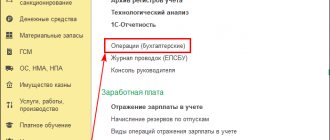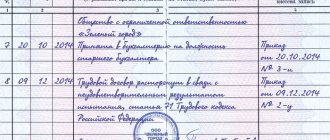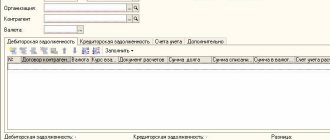The inspectorate can begin the forced collection procedure only if the company has a debt to the budget. Thus, additional assessments themselves as part of an audit do not constitute grounds for initiating collection, since, for example, a company may have overpaid taxes that exceed the amount of additional assessments.
The presence of arrears can be established by the tax authority during desk and field audits, as well as outside their framework (for example, if a company independently reflected the amount of tax payable in its declaration, but did not actually pay it). Information about the identified debt is reflected in the budget settlement card, and if the debt is not repaid by the company itself within the established period, the auditors send a demand for payment of taxes, penalties, and fines, which means the beginning of the procedure for the forced collection of fiscal debt.
Before collection
At the same time, preparatory work for collection begins much earlier than its actual identification and reflection in the inspection report. So, for example, currently, within no more than one month from the start of the on-site inspection, the debt settlement department of the inspectorate conducting the inspection must monitor the company’s solvency. This is done by obtaining information about the property on the company’s balance sheet, as well as obtaining a challenge to the registration authorities. Moreover, such information is collected not only in relation to the company itself, but also in relation to owners, managers and even affiliated companies.
The purpose of these actions is to ensure the most effective collection (including at the expense of property) when a tax debt is actually identified by the enterprise. The first step of inspectors in this direction is to apply interim measures based on the results of the audit, and their adoption does not even require the tax audit decision to enter into legal force.
Start of the procedure
After the tax audit decision has entered into legal force, the auditors begin the procedure for forced debt collection. The first step is to issue a demand for payment of the debt, which must be sent to the company within 20 days from the date the decision enters into legal force.
If the requirement is not fulfilled by the organization voluntarily within eight days, controllers move on to the next stage - debt collection from the current account.
The decision to collect funds is made within two months from the date of expiration of the deadline for payment on demand; collection orders are sent to the bank for the direct debit of funds to fulfill the obligation to pay taxes. At the same time, as an interim measure aimed at enforcing such a decision, a decision is made to suspend operations on the company’s accounts, which in its legal nature is almost identical to the ban on writing off funds applied at the stage of preliminary security.
Property foreclosure
The next stage - collection of debt from property - can only be applied if it is established that it is impossible to collect from funds in current accounts. It is important to note that even if there is no money in the bank, auditors will be able to proceed to the next stage - debt collection from the organization’s property - only after the end of the two-month period allotted for debt collection from funds.
This is due to the fact that during the specified period, the taxpayer’s account may receive the money necessary to pay the debt amount. At this stage, a decision is made on recovery at the expense of the organization’s property, as well as a resolution on recovery, which is sent to the bailiffs for execution. As an interim measure, the inspection may make a decision to seize real estate that is on the balance sheet of the organization that is subject to foreclosure.
Unlike the preliminary security discussed above, in this case the organization loses the opportunity not only to dispose of property, but also to own it (that is, to use it in current activities).
Property tax
First - money
The inspectorate has the right to make a decision to collect tax at the expense of the company’s property if the following conditions are met.
The requirement to pay the tax must be sent to the company no later than 3 months after the deadline for payment of this amount (Clause 1, Article 70 of the Tax Code). First, the Federal Tax Service Inspectorate forecloses on the funds contained in the company’s current account. The inspection is given 60 days to make such a decision, the countdown of this period begins from the date of expiration of the deadline for fulfilling the payment requirement. If there is no money in the current account or the tax authorities do not have information about the organization’s accounts, then the Federal Tax Service may lay claim to the company’s property. The inspectorate must make a decision on debt collection at the expense of the property within a year after the deadline for payment of the demand. In the absence of any of these conditions, the decision to collect tax from the property is considered to be made without sufficient grounds. This was indicated by the judges in the resolution of the Federal Antimonopoly Service of the Moscow District dated February 5, 2007 No. KA-A41/81-07. After the decision is made, the inspection must send the corresponding resolution to the bailiff within 3 days. If part of the amount has already been collected from cash, then the property will account for the remainder of the debt. Sometimes the following situation arises: the inspection sent a collection order to the bank, but there was no money in the current account. Then, in parallel, the Federal Tax Service Inspectorate forecloses on the property of the debtor enterprise. In the resolution of the Federal Antimonopoly Service of the Moscow District dated November 23, 2006 No. KA-A41/11381-06, the judges indicated that if the inspection did not revoke the collection order from the account on the day the decision was made to collect the arrears from the property, then such a decision is unlawful. Paragraph 6 of Article 46 of the Tax Code establishes that if there is insufficient or no funds in the account on the day the bank receives a collection order, the amount will be written off without acceptance as money is received in the account. Thus, it may result in double collection of the same amount of tax - both at the expense of funds and at the expense of property.
Before sending the resolution to the bailiff, tax officials must ask the bank about the status of the account. This is especially important if the company has more than one current account. The resolution of the Federal Antimonopoly Service of the Moscow District dated April 2, 2007 No. KA-A40/2277-07 considered the following situation. The company had accounts in two banks. One of them contained a sufficient amount of cash. The Federal Tax Service Inspectorate first sent a collection order there, but the bank returned it due to incorrect execution. The inspectorate did not send the order again to the same bank, but sent it to another, “empty” account.
And, having concluded that there were no funds, she foreclosed on the property. The court declared the decision of the Federal Tax Service unlawful.
Arrest on a first-come, first-served basis
What is meant by property that the inspectorate can foreclose on? This is “... property owned by an enterprise by right of ownership, right of economic management or right of operational management, regardless of where and in whose actual use it is located” (Article 58 of Law No. 119-FZ of July 21, 1997). First of all, cash and money held on deposit are seized. Further, seizure is imposed on securities, currency, non-production premises, passenger vehicles, and design items for office premises. Then there are finished products and other material assets that are not involved in production. Lastly, raw materials intended for production, as well as machines, equipment, buildings and other fixed assets (Clause 5, Article 47 of the Tax Code) are subject to arrest.
The property that the inspectorate can foreclose on includes the company’s receivables. It is taken into account as part of the first priority of the debtor’s property, subject to seizure and sale (Government Decree No. 516 of May 27, 1998). The procedure for foreclosure on the receivables of a debtor-organization is established by the Interim Instruction on the procedure for arrest and enforcement of rights (claims) belonging to the debtor as a creditor for unfulfilled monetary obligations of third parties to pay for goods actually delivered, work performed or services rendered (accounts receivable) upon foreclosure on the property of debtor organizations, approved by Order of the Ministry of Justice dated July 3, 1998 No. 76. The judges confirm the right of the Federal Tax Service to collect tax from the company’s receivables (Resolution of the Federal Antimonopoly Service of the Moscow District dated September 22, 2006 No. KA-A40/9048-06) . Financiers also have the same opinion (letter from the Ministry of Finance dated January 19, 2007 No. 03-02-07/1-15).
An attempt to conceal property belonging to a company from controllers may expose the head of the enterprise to criminal punishment. It is established by Article 199.2 of the Criminal Code. This is a fine in the amount of 200 thousand to 500 thousand rubles or in the amount of wages or other income of the convicted person for a period of 18 months to 3 years. It also provides for imprisonment for a term of up to 5 years with deprivation of the right to hold certain positions for 3 years.
Bankruptcy has its own rules
Articles 46 and 47 of the Tax Code do not apply in all cases when it is required to collect tax from a defaulter. Moscow judges reminded the inspectors of this when making a decision in the case dated May 14, 2007 No. KA-A40/3969-07. If an enterprise declares itself bankrupt and bankruptcy proceedings are opened against it, then the inspectorate cannot collect the arrears in an indisputable manner. In this case, the issue of collecting taxes from the enterprise is decided not by the inspectorate, but by the bankruptcy trustee. The debtor company pays for its obligations according to the rules defined by the Law of October 26, 2002 No. 127-FZ “On Insolvency (Bankruptcy)”. The amount that was presented by the Federal Tax Service after the court decision on the insolvency of this enterprise will be paid in the order of priority - after the debts included in the register of creditors' claims. A similar statement is contained in paragraph 13 of the resolution of the Plenum of the Supreme Arbitration Court dated June 22, 2006 No. 25.
Valeria Korbut
a comment
Head of the business consulting support department of AKG ARNI Polaris International Evgeniy Sitnikov :
— An analysis of judicial practice shows that the courts have not developed a uniform approach to the issue of the order of actions of the Federal Tax Service when making a decision to collect taxes at the expense of the taxpayer’s property when collection orders have already been issued to the company’s accounts.
In addition, paragraph 3.2 of the Methodological Recommendations for organizing interaction between the tax authorities of the Russian Federation and the bailiff service of the Ministry of Justice of the Russian Federation in the execution of decisions of tax authorities on the collection of taxes (fees), as well as penalties at the expense of the property of a taxpayer-organization or a tax agent-organization, approved joint order of the Ministry of Taxes and Taxes No. BG-3-29/619 and the Ministry of Justice dated November 13, 2003 No. 289 established the following rules. After receiving from the bailiff service a copy of the resolution to initiate enforcement proceedings, the inspectorate suspends the collection order issued to the debtor’s account and sends a corresponding decision to the bank on the same day. Thus, the revocation of the collection order is not a mandatory condition for the inspectors to make a decision to collect tax from the company’s property.
Taxpayers should also remember that if an enterprise has a tax arrears and the Federal Tax Service Inspectorate has reasonable grounds to believe that the company will take measures to escape or hide its property, inspectors can seize the debtor’s property. The arrest in these cases must be authorized by the prosecutor (Clause 1, Article 77 of the Tax Code). As for the order of actions of the regulatory authorities in this case, the order is as follows: a decision to seize property cannot be made earlier than a decision to collect tax at the expense of the taxpayer’s property.
Important regulations
It is important to note that all stages of the forced collection process are strictly regulated by tax legislation in terms of the timing of certain actions: for example, the inspectorate must have time to make a decision on the collection of tax debt at the expense of funds within two months, and in the case of collection at the expense of property - within one years from the date of expiration of the debt payment period established in the Request. These deadlines are established by Articles 46 and 47 of the Tax Code of the Russian Federation and are preclusive. If the inspection makes a decision on collection in violation of the established deadlines, such decisions are considered invalid and cannot be executed. In this case, auditors have a chance to collect the debt only in court.
When considering the issue of compliance with the rules of the forced collection procedure, the courts note that the Tax Code does not contain any grounds for skipping the first stage (collection at the expense of funds) and immediately initiating the second stage (collection at the expense of property). Thus, the Constitutional Court in Ruling No. 1032-O-O dated June 4, 2009 indicated that foreclosure from the company’s property is allowed only after the possibilities to repay the debt from the organization’s funds have been exhausted.
In Resolution of the Presidium of the Supreme Arbitration Court of the Russian Federation dated May 11, 2010 No. 17832/09, the court recognizes that the first stage of extrajudicial collection is mandatory, and its exclusion from the process entails the recognition of the decision to collect tax debts at the expense of property as invalid and unenforceable.
In addition, given that the tax authority in the situations under consideration nevertheless began the extrajudicial collection procedure, the court concluded that its right to extrajudicial collection was thereby exercised. This circumstance, according to the arbitrators, deprives the inspectorate of the right to go to court to collect unpaid taxes, which is possible only if it is impossible to independently collect taxes, but not if the procedure established by law is violated.
A similar conclusion was made in paragraph 55 of the Resolution of the Plenum of the Supreme Arbitration Court of the Russian Federation dated July 30, 2013 No. 57 “On some issues arising when arbitration courts apply part one of the Tax Code of the Russian Federation.”
note
When considering the issue of compliance with the rules of the forced collection procedure, the courts note that the Tax Code of the Russian Federation does not contain any grounds for skipping the first stage (collection at the expense of funds) and immediately initiating the second stage (collection at the expense of property).
It states that the tax authority has the right to proceed to forced collection of tax from other property of the company only after taking appropriate measures to collect it from the company’s funds, and failure to make a decision on collecting tax from funds within the period established by Article 46 of the Tax Code and the failure to take measures to implement it, as a general rule, exclude the possibility of controllers making a decision to collect tax at the expense of other property of the organization, as well as filing an application with the court under Article 47 of the Tax Code.
Indisputable collection of tax debt by the tax authority from the taxpayer
The procedure for collecting debts on taxes, insurance premiums, penalties and fines begins with sending a tax payment request to the taxpayer.
As a general rule, it is sent no later than three months from the date of discovery of the arrears, and if non-payment is revealed as a result of a tax audit, within 20 days from the date the final decision enters into force. The taxpayer is obliged to pay the debt within eight working days from the date of receipt of the request. Otherwise, the tax authority will begin to forcibly collect the debt.
Currently, the Government of the Russian Federation has increased the deadline for sending a claim by six months, which follows from paragraph 7 of the Decree of the Government of the Russian Federation dated 04/02/2020 N 409. Consequently, the specified period will be, in particular, nine months from the date of discovery of the arrears or six months and 20 days from the date of entry into force of the relevant decision made by the tax authority based on the results of the audit.
The provision on the extension of deadlines is urgent and is valid until December 31, 2020 (clause 5, clause 3, article 4 of the Tax Code of the Russian Federation).
It should be taken into account that, first of all, the tax authority will foreclose on the taxpayer’s funds in the bank. And if these funds are not enough, the penalty will be applied to the taxpayer’s property (clause 7 of article 46, clause 1 of article 47 of the Tax Code of the Russian Federation).
Procedure for collecting tax debts
Collection of debts on taxes, insurance premiums, fines and penalties at the expense of the taxpayer’s funds is carried out by the tax authority in the following order:
- the tax authority makes a decision on collection and sends an order to the bank to write off funds in an indisputable manner;
- the bank executes the order of the tax authority and debits funds from the taxpayer’s bank accounts, directing them to the budget.
The process of collecting tax debts from the tax authority
The procedure for collecting the relevant amounts consists of the following steps taken by the tax authority:
- The tax authority makes a decision on the collection of additional tax assessments in accordance with paragraphs. 3, 9, 10 tbsp. 46 of the Tax Code of the Russian Federation no later than two months after the expiration of the deadline for fulfilling the demand for payment, if the total amount of arrears, penalties and fines specified in the demand exceeds 3,000 rubles.
If the specified period is missed, collection of additional accruals is possible only in court. A decision made by the tax authority after missing a deadline is invalid and cannot be enforced, as follows from clause 3 of Art. 46 Tax Code of the Russian Federation;
- no later than two months from the day when the total amount of arrears, penalties and fines exceeds 3,000 rubles, if the demand was initially raised for an amount less than 3,000 rubles, but within three years from the date of expiration of the deadline for its execution, the total amount to be recovered from the organization exceeded 3,000 rubles;
- no later than two months from the day when three years have passed from the end of the deadline for fulfilling the earliest requirement for payment - if the amount of arrears, penalties and fines to be collected from the organization does not exceed 3,000 rubles. within the specified period;
Increasing the deadline for making a decision on tax collection
In the current conditions, the Government of the Russian Federation has increased the deadline for making a decision on collection by six months, which follows from paragraph 7 of Resolution of the Government of the Russian Federation dated April 2, 2020 N 409.
The tax authority communicates this decision to the taxpayer organization within six working days after it is made and sends an order for write-off and an order for the transfer of electronic funds to the bank.
It must be borne in mind that after making a decision on collection, the tax authority has the right to suspend the taxpayer’s transactions on bank accounts and electronic money transfers (clause 8 of Article 46, clauses 1, 2 of Article 76 of the Tax Code of the Russian Federation).
In addition, as stated above, if the funds in bank accounts are not enough to pay additional assessments, the tax authority has the right to seize the taxpayer’s property (clauses 1, 3 of Article 77 of the Tax Code of the Russian Federation).
How debt is written off by the tax authority
In accordance with paragraph 5 of Art. 46 of the Tax Code of the Russian Federation, the bank writes off the taxpayer’s debt from those accounts and in the amounts that the tax authority indicated in the instructions for write-off.
First of all, the bank will write off funds from the taxpayer’s settlement (current) ruble accounts. If there are insufficient funds in these accounts, debits will be made from foreign currency accounts, and then from the taxpayer’s precious metals accounts. Lastly, the recovery is applied to electronic money (clauses 5, 6.1 of Article 46 of the Tax Code of the Russian Federation).
It is necessary to note that the bank, on behalf of the tax authority, will be obliged to sell foreign currency and precious metals from the taxpayer’s accounts and repay the debt from the received amounts in rubles. The costs of this operation are paid at the expense of the taxpayer (Clause 5, Article 46 of the Tax Code of the Russian Federation).
It should be borne in mind that funds from deposits can only be written off after the end of the deposit period (Clause 5, Article 46 of the Tax Code of the Russian Federation). Consequently, in this case, the bank must wait until the end of the deposit period, and only then write off funds in favor of the budget.
How does the bank write off?
If there are sufficient funds in the taxpayer’s account, the bank will write off the funds in the following order and terms:
- from the taxpayer’s ruble accounts - no later than the next business day from the date on which the bank received the tax authority’s order;
- from foreign currency accounts and from accounts in precious metals - no later than two business days from the date on which the order was received;
The procedure for writing off funds from taxpayer accounts is regulated by both civil (Article 855 of the Civil Code of the Russian Federation) and tax legislation (Article 46 of the Tax Code of the Russian Federation). Based on this, if claims of the first and second priority are presented to the taxpayer’s accounts, the bank is first obliged to pay off these claims, and then will fulfill subsequent demands of the tax authority.
The bank will execute the order to write off funds until it is suspended or revoked by the tax authority (clause 4.1 of Article 46 of the Tax Code of the Russian Federation).
For example, the effect of an order for write-off may be suspended by a ruling of the arbitration court when the court takes interim measures (Articles 91, 96 of the Arbitration Procedure Code of the Russian Federation).
Revocation of instructions for write-off
Cases in which the tax authority revokes unfulfilled instructions for write-off are specified in clause 4.1 of Art. 46 Tax Code of the Russian Federation:
- tax debt has been fully repaid;
- the taxpayer received a deferment or installment plan for the payment of taxes, penalties, and fines;
- the amount of tax, penalties, fines is reduced in the updated declaration sent by the taxpayer to the tax authority;
- the amounts of arrears and penalties were declared uncollectible and written off;
- the relevant legal documents on the basis of which the tax authority carried out the relevant penalties were canceled or declared invalid in a judicial or administrative manner.
The tax authority must make a decision on the revocation of instructions. Otherwise, the taxpayer has the right to appeal the inaction of the tax authority, initially to a higher tax authority, and then to the court.
If the bank executes an order that is subject to cancellation, the funds debited from the taxpayer's account will be considered overcharged. The tax authority is obliged to return them and pay interest on the amount of funds collected in excess (clauses 1, 9, Article 79 of the Tax Code of the Russian Federation).
We will prepare a complaint against the decision of the tax authority
Urgent Competently Confidential
Order a complaint






